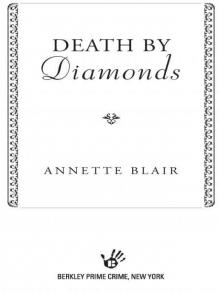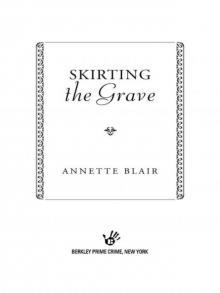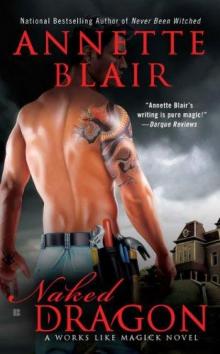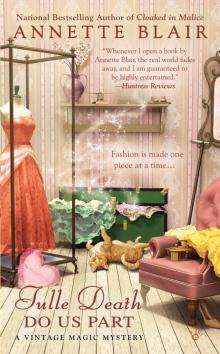- Home
- Annette Blair
Skirting the Grave Page 14
Skirting the Grave Read online
Page 14
Twenty-nine
Design is the search for a magical balance between business and art; art and craft; intuition and reason; concept and detail; playfulness and formality; client and designer.
—VALERIE PETTIS
“Did you ever catch the guy who took our picture?” I asked Werner.
“No, he had a car waiting for him across the street in the bookstore parking lot.”
“Even with my track record, a guy running in to take my picture is weird.”
“Our picture.” Werner spoke with an unmistakable, deep-down satisfaction.
I touched his face and startled him.
“Mad, you’re like ice,” he said, chafing my hands.
“Nice.” I shivered, though I wasn’t sure why, and Werner moved to warm me with his arms along mine; then he stretched out and occupied almost the same space on the couch, his hand warming me everywhere, making me toasty deep down, inside and out.
“Are you sure you wouldn’t like the mink over you?” he asked.
“Hermès, no!” My teeth began to chatter. Vision overload, I thought. A lot like short-circuiting in cold storage.
I felt breathless like in the car when he took my hand. Strangely intimate. A little scared. Shivery with . . . guilt?
Then he leaned in and kissed me. His lips held the kind of warmth I sought, so I made sure to keep them where they were, against mine. A chaste kiss, by new millennium standards, though it lasted, causing an inner warmth I craved. In the back of my mind, I knew this was less about romance and more about me being a heat-seeking missile right now. I’d have to remember to tell Werner.
One of us groaned. Maybe both of us. We came up for air at the same time, stared with shock into each other’s eyes, and he swooped in for more.
I squeaked like we’d been caught when his cell phone rang.
He swore but answered, straightened, sat up, and listened as if to catch every word. Then he hung up.
“We got a faxed copy of the paperwork on the York embezzlement case,” he said leaning back against the fainting couch and pulling me against him.
“And?” I asked, eager to hear.
“It seems Quincy York blew the whistle on his brother, then he made a public and televised plea for leniency at Patrick’s circus of a trial.”
“Hmm,” I said. “Not that I’m like my father, but . . . that reminds me of an old saying: ‘When a tree falls in the woods and nobody hears, does it make a sound?’”
Werner frowned. “Say what?”
“I mean, the first selectman candidate of Kingston’s Vineyard made sure the world heard a tree fall, one way or another. He showed off both the extent of his assets and his kindness.”
I tried to phrase it better. “Quincy York revealed himself as rich, law-abiding, and vulnerable to being taken advantage of by his family. And he ended up looking generous, righteous, and understanding.”
Werner nodded slowly. “So you think it was about what the world saw, not what really happened?”
I shrugged. “It’s just a theory.”
“A logical one,” Werner said. “When the candidate turned in his brother, the world saw a man ‘doing the right thing’ with deep regret. They might have seen him as a man they’d want to vote for.”
“I think the entire York family should go on our suspect list.”
“Even your Isobel?” he asked.
“To be fair, yes. And Giselle, too.”
“Isobel’s twin is an official missing person. Nobody’s seen her for months.”
Except maybe the clients who hire her. “I hate that she’s missing. One twin would inherit more without the other.”
“Face it, Mad, they both have motive, if Giselle’s still alive.”
“Or dead. Also, the twins stand to inherit more from Grand-mère, with their first cousin out of the picture.”
“Motive for Payton’s murder is starting to crop up everywhere,” he said.
“Lytton, would you let me examine the clothes she was wearing when she died?”
“Why?”
“I know clothes. I studied them, fabrics and construction, thread types, workmanship; they all say a lot about the wearer. I can practically read clothes. I might see something a forensics scientist would miss.”
“Fine, but you’ll have to come to the station around nine in the morning, before the forensic lab’s ten o’clock pickup.”
“I’ll be there.”
A member of the Mystick Falls police force walked in.
“Stevens?” Werner said, getting off the fainting couch, taking off his suit jacket and setting it over my shoulders. “What are you doing here?”
“I picked the short straw, sir.”
“What?”
“I lost the bet, so I’m here to tell you—That is, we thought you needed to know, Sarge, that the deceased’s uncle, Candidate York, commandeered the Pearl Seahorse for his on-site campaign headquarters.”
“The people of Mystic aren’t even his voters,” Werner said.
I tugged on the leg of Werner’s slacks. “Bigger picture, remember? Governor’s mansion. White House.”
“For the love of—I suppose he’ll be easier to investigate close by,” Werner conceded, giving away his agitation by jiggling the keys in his pocket.
“His campaign manager will be closer, too,” I added.
Stevens rolled his hat in his hand. “After you left, sir, we had to send an officer down to direct traffic, sir, while York and his entourage moved in. He bought out the hotel. The owners had to find their guests other accommodations.”
Stevens took a step back when Werner cleared his throat. “I have to say it again, or go and grab somebody by the throat: They’re just making our jobs easier.”
“I don’t know, sir, they’ve already held a press conference.”
“Please tell me it was to tell the world they were here.”
Stevens shook his head and backed up another step. “No, sir. Basically, they said Quincy York’s niece had been murdered, and York is here to oversee the Mystick Falls Police investigation.”
“Oversee?” Werner snapped. “And he used the word ‘murdered’?”
“York really meant ‘profit from,’ ” I said. “You know, snatch the sympathy votes while the snatching’s good?”
“A servant of the people just told a murderer, or three, that the police are on their tail! Is York an idiot or what?”
Werner charged over to Stevens, and the poor officer jumped and about scuttled out of range while looking to me for help.
“Now, Lytton,” I said.
Werner wagged a finger at his beleaguered officer. “If I hear as much as a snicker about me and Miss Cutler at the station, Stevens, or outside the station, you have parking meter duty every winter until you retire.”
“Yes, sir. Never saw a thing, sir.”
“Thank you, Stevens,” I said, getting up to stand beside Werner while Stevens went out and got into his squad car. Then I closed the shop door and leaned against it, putting myself between the mad detective and his short-straw minion.
“You can’t hold Stevens responsible if you hear anything about us. Tunney saw how worried you were. A liaison between us is already on the fast track to gossip central.”
Werner groaned, but “The Purple People Eater” started to play, fitting, after this wild wack-a-doo day, and the music made him smile.
During “Catch a Falling Star,” he lowered his mouth to mine, and for the first time, I raised my arms to slide them around his neck and hold on. As an experiment.
Necking. That’s what we were doing. Good oldfashioned necking, until “The Great Pretender” came on and I stepped from his arms.
I turned off the iPod and homed in on Grand-mère’s trunk. Why had she packed up those clothes in particular? Why bury a decade, so to speak?
And what, pray tell, happened to Grand-père?
Thirty
On the subject of dress, almost no one, for one or another reason, feels truly indif
ferent: if their own clothes do not concern them, somebody else’s do.
—ELIZABETH BOWEN
I came down my father’s stairs the next morning to a houseful of family and friends at the breakfast table.
“I just set Brandy up with a new wardrobe,” I said, “and she looks splendid in almost everything I brought from the shop. Very few discards.”
“Not counting the pieces you lent her from your own collection,” Isobel said. “You’re a good sister.”
“She is,” Sherry said as I kissed her cheek.
“No, don’t get up.” I squeezed her shoulders. “You’ve got too much to carry, there. You’re sure it’s not twins?”
Sherry chuckled as she gave Alex’s little Kelsey another piece of toast.
“Brandy looks like a successful businesswoman,” I added, “and she’s got a few outfits that make her look like one hell of a development director.”
Nick slapped a folded newspaper into my hand, no mornin’ nod or eye twinkle.
Stumped, I opened the paper and gasped. The headline: “Detective Chooses Two-Step Over Investigation,” topped a big-ascot picture of the two of us dancing.
The news story went on to elaborate the ways in which Detective Sergeant Lytton Werner was too busy with the owner of the local secondhand shop—I gasped in indignation—to do anything about finding the killer of Candidate Quincy York’s dearest niece, Payton.
“His only niece,” I said. “So, the photographer came from campaign headquarters. Here’s an unpaid political ad, if ever I saw one.”
I caught Nick watching me. That’s why he gave me the cold shoulder, and why he let Isobel fawn over him at breakfast. Payback, which I deserved. And I wouldn’t insult him by trying to explain the fifties music thing.
Funny how Isobel’s father, the candidate, didn’t seem worried about his twins’ welfare, in light of his niece’s death. Didn’t care that he hadn’t seen Giselle in months or that Payton died disguised as Isobel, which might mean that Isobel was being hunted by a killer. If he cared at all for them, he would have used his money to send people looking for Giselle to make sure she was okay, and he would have hired a bodyguard for Isobel. And he wouldn’t have made a three-ring circus of the investigation, putting them both in more danger in the event the murder was a case of mistaken identity.
“Isobel, has your father called you since he moved to town?”
She looked up. “He moved to town?”
“Yes, campaign staff and all, but you’re safer in Nick’s care living here. Don’t let him talk you into moving to the Pearl Seahorse.”
“Don’t worry.” She mocked the suggestion with a snarky chuckle. “He won’t try.”
Before I could comment, Brandy came down the keeping-room stairs and gathered a small admiration society doling out comments and compliments. She held herself as if she felt like a new woman, a woman in charge, because she looked like one.
A minute later, Cort, Sherry’s father-in-law and Brandy’s host for the week, kissed Brandy’s brow in greeting. He gave the same attention to Sherry, about to bear his second grandchild—he had sole custody of his first, little Vanessa, whose father died serving in Iraq. His fiancée, Amber—Vanessa’s mother and Cort’s daughter—was doing an extended stint in a psychiatric facility.
Cort grabbed Brandy’s bags.
As for her, she looked like a new woman.
I never thought I’d see the day Brandy could befriend a millionaire non-philanthropist, unless she knew something about Cort I didn’t.
Before she preceded him out the door, she came to give me a thank-you hug. She’d never held so tight. As for me, thinking of Isobel and her distant family, neither had I held so tight or appreciated Brandy so much.
“Good luck, sweetie. Call me if you need me,” I said. “Fund-raiser’s right on schedule, though. Everybody’s picking up their fifties formals for the big evening event. Some chose fifties day wear for the afternoon garden party/car show.”
“You, too,” Brandy said. “Good luck sleuthing.” She eyed the newspaper, dancing picture side up. “Good luck all around.”
Several of us watched Brandy and Cort drive away, though we weren’t the entire family, since Tricia was sleeping in, and my dad had yet to return from Fiona’s.
“I’m off to the morgue,” I said. “If anyone cares. Werner’s going to let me look at the clothes Payton was wearing.”
Isobel sat straighter. “That’s smart. Nobody knows clothes better than you do.”
Had I told her that Payton died wearing rags?
“Detective Werner told me Payton’s outfit seemed odd,” Isobel said, furrowing her brow. “Or my dad told me, or Ruben did.”
Ambiguity was so not welcome at this point in the investigation.
Werner seemed to be waiting for me as he paced his office.
He whistled when he saw me.
Besides Isobel, he was the first to appreciate my sixties Geoffrey Beene mint green linen slit-neck swing dress, paired with bow-topped natural python platform pumps.
“You look like a meadow in a bottle,” he said. “A real tonic.”
“Bet you say that to all the glamazons.”
He winced, because those had been fighting words in third grade. His words.
“That’s a compliment these days,” I assured him. “Don’t worry, no more name-calling. What’s got you so happy?”
“You can tell, hey? With Nick’s FBI connections, he tracked down the money Patrick York embezzled.”
“The fortune that went missing a few years ago? That’s big. So that was Nick’s case with its tentacles around the throat of our case? I guessed correctly.”
“Yep. After tracing a series of York holding and dummy companies incorporated under fake names, nonexistent subsidiaries, and subdivisions, Nick and I sort of found it at the same time in Ruben Rickard’s own convoluted financials.”
“I knew Rickard was too cocky. When did you and Nick do all this?”
“Almost all night last night. Why?”
“Just wondering. So how does it help solve Payton’s death?”
“Oddly enough, Payton’s name was on one of Rickard’s fake companies.”
“So you think they were embezzling partners and they let her father go to prison for their crime?”
“That might be jumping the gun, but it’s a distinct possibility we’d need to prove.”
“I must say that I’ve lost a bit of sympathy for her, but may I see her clothes, anyway?”
“The forensics lab came for her body at eight, couple hours earlier than expected, but I held the clothes back for you. I can messenger them over when you’re done. No need to go to the morgue; they’re in my office, but you have to wear latex gloves to touch them.”
Gloves to touch thrift store throwaways? It might work for the future, to keep me from having public visions, but would it work? I mean, how would I look fitting a dress wearing latex gloves? Like a freak of nature?
On the other hand, I might need a reading. How do I pull that off wearing gloves?
When, as I feared, I got nothing from the clothes, I skimmed my exposed wrist above the gloves, along the peach peasant blouse. As I did, I heard “Good, the bitch’ll look like crap in that,” in a deep, modulated voice.
It all happened in a blip, and I barely blinked, though I wasn’t sure when Werner got so close. I turned to him. “Somebody went Dumpster diving for these. Cheap, no personality. Definitely not something a York would wear, any York. My instinct is that she was being demeaned on purpose, maybe controlled, especially on the train, possibly with the trace drugs found in her system.”
“Good hypothesis,” Werner said, “because the trace drug, while it could make her easily manageable, couldn’t kill her, and it would have been taken in pill form. But there’s a single recent needle mark in her arm with no drug to account for it being there.”
“What requires a needle to inject but leaves no trace?” I asked.
“Air,�
� Werner said. “Insulin, because it occurs naturally in the body, though too much can kill, like certain minerals. I’m sure forensics has a long list of injectable invisible killers.”
“Speaking of injections, Grand-mère’s a diabetic,” I said. “There were old needles in the top tray of the trunk.”
“Did you touch them?”
“Of course n . . . no, actually.”
“I’m gonna send somebody over to dust that trunk and everything in it for prints. Should have done it before.”
“I need the roller skates for Saturday.”
“Hold that thought. I gotta take this call.” He listened and hung up. “This is odd, but a transporter from the forensics lab is here for Payton.”
“I thought they came two hours ago.”
“So did we all. Whoever took her body was evidently not from the lab we hired. The medical examiner said the early paperwork was in order. Two people came for her then, a male driver and his female intern.”
I indicated his door. “Should we go talk to the morgue staff, see if we can get a description of the drivers?”
“We can do that if the morgue surveillance cameras don’t show us anything. With cameras at different angles, we can usually get a license plate and ID the drivers.”
I followed him to the morgue for a copy of the visitors’ log. “I want you to know that no blame is being placed,” he told his peeps, which they seemed to appreciate.
I followed a silent Werner to a room with a bank of wall monitors.
Werner introduced me to Officer Zales, at the controls, and handed him the log copy. “Right there,” Werner said, pointing to the second to the last entry. “To the minute, pull up the surveillance.”
“Of course, both drivers are wearing billed uniform hats, pulled down to cover their eyes, and dark glasses,” I said as the video came up from different angles on six screens.
Werner jingled the change in his pocket, a sign of tension. “The driver’s moving like he knows where our cameras are,” Werner remarked. “He’s rubbing his face, scratching his nose. Whoops, there go his keys, and he picks them up in a forward surge until he’s out of camera range.”

 Cloaked in Malice
Cloaked in Malice UNFORGETTABLE ROGUE (The Rogues Club, Book Two)
UNFORGETTABLE ROGUE (The Rogues Club, Book Two) Unmistakable Rogue
Unmistakable Rogue Butterfly Garden
Butterfly Garden Jacob's Return
Jacob's Return Vampire Dragon
Vampire Dragon A Winter Heart, Sexy Amish Historical Novella
A Winter Heart, Sexy Amish Historical Novella Scandalous Brides
Scandalous Brides Untamable Rogue (Formerly: A Christmas Baby)
Untamable Rogue (Formerly: A Christmas Baby) Captive Scoundrel
Captive Scoundrel A Veiled Deception
A Veiled Deception Death by Diamonds
Death by Diamonds Skirting the Grave
Skirting the Grave Sex and the Psychic Witch
Sex and the Psychic Witch Larcency and Lace
Larcency and Lace Naked Dragon
Naked Dragon Undeniable Rogue (The Rogues Club Book One)
Undeniable Rogue (The Rogues Club Book One) Proper Scoundrel
Proper Scoundrel Tulle Death Do Us Part
Tulle Death Do Us Part